The Great Unknown
Welcome once again (you poor, doomed masses) to yet another exciting year of study at the Colorado School of Mines. Major construction to the final building on campus is nearly complete, which means increased parking (Coming Soon: severely reduced parking). Furthermore, your friendly CSM Anime Club (CSMAC) has returned to the luxurious HH202 lecture/theater hall. Even your humble president “Boku wa” Jack Kelly has returned with 1 “successful” semester of leadership under his non-existent belt. While much about this coming semester is known, there is far more which is not. Will you survive Mines’ latest onslaught against your sanity? Will there be any decent anime from Spring and Summer 2012? Will Jack learn to group shows by an actual theme? Find the answer to these questions and so many others in this week’s review.
Sengoku Collection
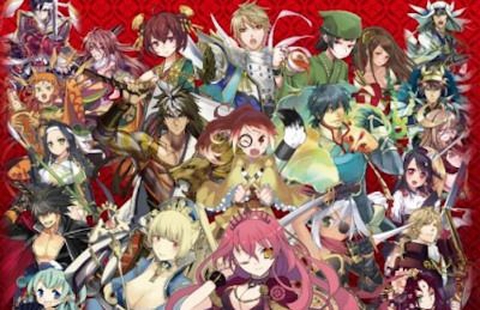
AKA Freezing
In a time and space different from our own (though not unlike the land of Touhou), the generals of the Warring States period vie for power. But they’re the same generals we know in name only: their appearance, personality, and gender are all different. One day, first Oda Nobunaga and then all the others are transported to our world. Everything is new to them – bicycles, cell phones…packaged ramen… Each episode focuses on one general and how she learns to adapt to the modern world.
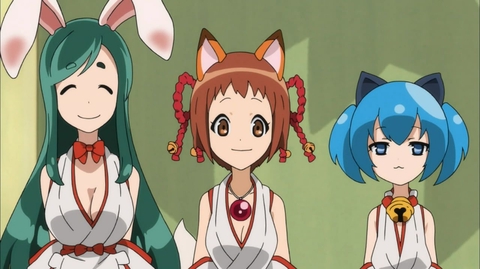
And we're sure this isn't Touhou?
So “Boku Wa” Jack has, in his infinite wiz-dumb, decided to scare off all the newcomers to CSMAC with Sengoku Collection, an anime that started life as a humble Japanese social networking game. Using the tumultuous Sengoku Era of historical Japan as the back story for these dimension-travelling military masters of Japan’s first shogunate, Sengoku Collection does what countless other gender-bending Warring States anime do: suck. The characters are practically all one-off, only appearing in single episodes, rendering the entire series to an episodic string 13 hours long. More importantly, the historical figures are now all female, moe, and wear small crowns (seriously, is this Touhou yet?). Furthermore, it seems that the more important the character was in history, the more loli-fied she must be. The bizarre counterbalance is that because they all wanted to unite Japan in the Sengoku era, they have returned in the form best suited to unite Japan in the modern era: as pop-idols. From here, each character tries adapting to the modern world, with some relinquishing their plans of domination, while others embrace their new loli-personae. Meanwhile, main character Oda Nobunaga randomly pops in at the end of every episode to take Precious Treasures from the respective character (a mainstay from the social networking game).
With this information in mind, the show at least performs what is asked of it: advertising the game in Japan. As for actual entertainment, it’s terrible. If you don’t know the history behind the namesake characters, then many of the “jokes” are lost. Likewise, if you DO know about them, then you’ll likely be enraged by their new….everything. Too little translates for the series to be funny, or engaging, or entertaining at all. The episodic nature all makes it extremely difficult to identify with or care about anyone on the screen, since any one of them has only 15 minutes of screen time. While the series isn’t physically painful to watch, it won’t make the viewer feel anything either, aside from embarrassment for Brains Base having accepted money to animate this travesty.
Speaking of animation, it’s as poorly done as the show’s premise. The backgrounds are hideous, often poorly drawn and/or minimally animated. The foreground is often also crumby, with frequent cases of improper shading and sparse coloration. NPC’s are crudely drawn and greyed out. Several times, the animators even resort to using Shin-Chan animation styles, making the awkward scenes far more so than they should be. Though it’s not all bad, as the Sengoku figures have “unique” and consistent designs that are spot-on with the game’s counterparts (at least they got the advertising done right).
Then comes the music, and everything truly falls apart. If you’re going to make a series that turns military masterminds into pop-idols, at least make the music decent. And it’s not. It’s forgettable and adds nothing of value to the episodes. In fact, the characters are rarely ever shown actually singing. There is either a montage of them becoming successful pop-idols or just magazines and posters conveying that they are already pop-idols.
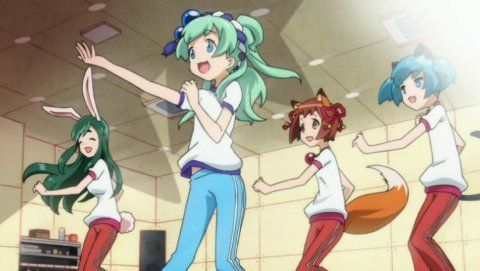
Too bad the Backup Dancers are more memorable than the Generals.
Sengoku Collection is yet another reason why advertisers should never be in charge of anime production. It’s a shill of a show in every sense of the word. It’s an anime meant to advertise the game, regardless of either media’s quality. Sengoku Collection gets an early curtain call.
Space Brothers
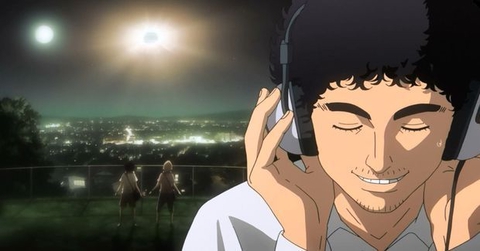
Feels so Moon.
In the heady days of 2006, when the Colorado Rockies were trolling its fans with failure most epic and soccer superstar Zinedine Zidane was head-butting his way to retirement, young brothers Mutta and Hibito were out making recordings of nature in the nearby woods. Suddenly, they glimpse an awe-inspiring sight in the sky: a giant spinning UFO. After the craft spun its way to the dark side of the Moon, the brothers promised each other they would become astronauts. Now, in 2025, Hibito has followed his dream to become the first Japanese man on the moon, but Mutta has just been fired from his job as the lead designer at a car company.
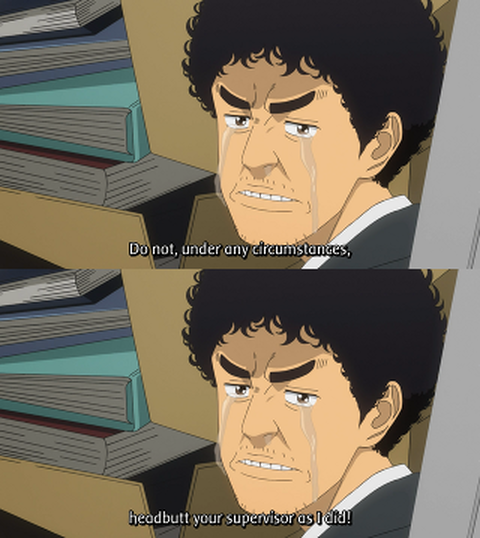
Advice that all mechanical engineers should live by.
After hearing that his brother has been blacklisted from the entire automotive industry, Hibito reminds him of their childhood promise and submits his resume to JAXA. After his application is accepted, Mutta decides once again to aim for space.
Every once in a while, an anime comes along that viewers can actually identify with. At first glance, the idea of exploring The Final Frontier seems entirely too lofty for the everyman to embrace. Yet despite the all-encompassing theme of space exploration, Space Brothers could not possibly be more human a story.
After witnessing a UFO one night in 2006, Hibito tells his older brother that he wants to become an astronaut when they grow up. Mutta, the quintessential older brother, says that he does as well. The overarching theme becomes “The older brother should always lead the younger brother. That is his duty for having been born earlier.” With this understanding, the viewer then cuts to Hibito being announced as the first Japanese man that will set foot on the Moon. Meanwhile, Hibito is getting fired for head-butting his boss for insulting Hibito (what the hell kind of head engineer mocks the first of his fellow countrymen for landing on the freakin’ Moon, and to his fucking brother’s face!?!). After enduring some time as a laughable failure, Mutta gets accepted into the JAXA astronaut testing program. From there, the early episodes take the viewer through the popular conception of the testing program, including lung capacity, psych evaluations, and *cough* physical examinations. During Mutta’s trials, he makes friends with nice guy Kenji and strange yet beguiling potential love interest Serika.
The plot itself is fairly dry by this point, but fortunately, all of the characters are decidedly not. Everyone has a distinct personality (with multiple facets!), and their interactions are constantly interesting (if not simply amusing). Since the first half of Space Brothers is strictly from Mutta’s point of view, he becomes the most identifiable main character, and he is readily identified as a goofball…a nerdy, awkward, self-deprecating goofball. However, he does have many legitimate skills. He’s an award-winning car designer, a mechanical engineer, an extremely acute observer, and he plays the trumpet simply because it’s the most difficult instrument he can think of. He’s obviously not afraid of a challenge, but he’s always screwing up some part of his application process, and he often shoulders a self-defeating attitude. Then there’s his goofiness. Sure, his Japanese afro and his funky tilted walk are eternally entertaining to watch.
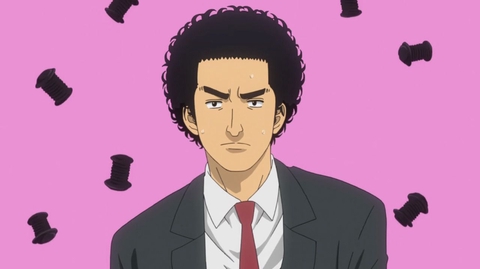
And I mean REALLY entertaining to watch.
However, individuality is rarely ever tolerated in Japanese industry, let alone such an awkward and slightly depressing demeanor. With such glaring quirks, it’s surprising that Mutta made it as far as he did before getting fired. Furthermore, since so many of the flashbacks show Mutta and Hibito as inseparable, constantly training, and completely determined to become astronauts, why is Hibito the one in a space module and Hibito is designing cars? It’s strange plot holes like this that crack the story, but thankfully do not break it. After all, this is a character-driven story, and it takes the series to some great places.
Regrettably, the scenery on the way to those places is a lot like driving through Missouri: monotonous, simplistic, and otherwise uninteresting. Mind you, there are some neat moments, such as the UFO scene, the childhood JAXA tour, and Mutta trumpeting his joy at pursuing his dream with the sun setting and the Moon overhead. However, everything else strives to keep the animation strictly in the background. It should also be noted that although it is the year 2025, almost nothing in this setting has changed. People still ride the same trains, phones aren’t transparent, nothing hovers, and cars (more or less) still look like cars. That aside, the show does its best to minimalize outside distractions. Since Space Brothers is almost entirely character driven, the characters of course get the most budget. While the characters themselves don’t have any particularly memorable designs, they are each highly distinguishable (especially Mutta), proportional, consistent, and most of all, human. You’d think that last part would be perfectly obvious, but animation styles are often so separate from reality that it is refreshing to see characters that are actually realistic. From there, the animation is often used for off-beat humor, and to great comedic effect.
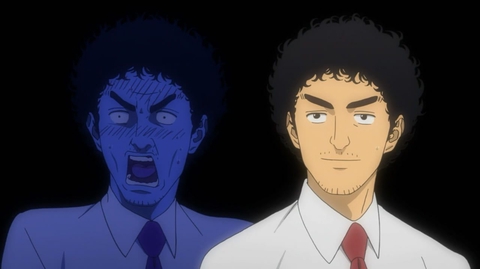
This guy actually has a “Your Face When” counter.
It’s almost completely centered around Mutta and his myriad mistakes, but these reactions make him all the more relatable. The other characters (Serika in particular) have their own moments of comedy, but nothing seems out of place. If anything, it brings the characters closer, and comedy with a purpose is all but unheard of.
The music, mostly orchestral, can be inspiring, be it certainly has its limitations. Tracks are simple and often (almost too often) recycled for many scenes. Some scores do augment the more pivotal scenes (even to memorable effect), but the rest merely move the story along, which moves the characters along. Again, everything else takes a back seat to the characters, which in this case is a good thing. Of course, this means that there is a lot (i.e. ALL) of pressure on the character interactions being pitch perfect, every time. And the series does end up being pitch-perfect, at least 9.5 out of 10 times, which is still great for modern anime.
If you like space, had/have an awkward personality, enjoy challenges, and/or like character-driven stories, then I highly suggest you check out Space Brothers, a truly stellar anime for the space age.
NOTE: As I write this review, it is reported that Neil Armstrong, the first human to set foot on the Moon, has died at the age of 82. His words should ring especially true here at the Colorado School of Mines:
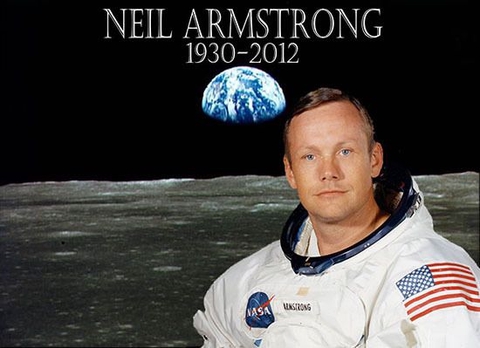
May his humble pioneering spirit forever endure.
Polar Bear Café
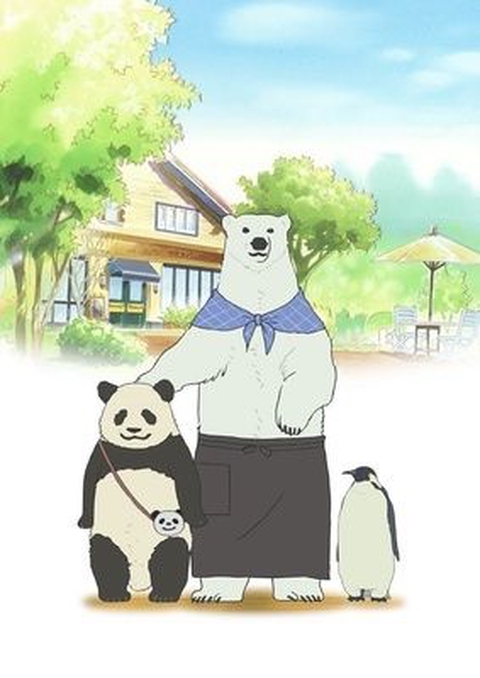
AKA Seinfeld
Polar Bear runs a café in the woods, which serves both humans and animals daily. Lazy Panda finds it one day while searching for a job. He quickly becomes a regular, despite Polar Bear turning him down flat when he asks for work. Together with Polar Bear and fellow regular Penguin, he eats, chats, hangs out, and has a variety of everyday adventures with the people and animals he meets.
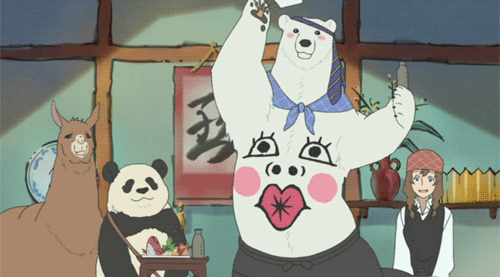
Bears…
As painful as it is to watch a boring series that you had high hopes for, it is arguably worse to watch a series that intentionally starves its audience. Polar Bear Café is a wisp of a show in every way, and yet it sees itself fit for the comedy genre (because animals lazing about certainly isn’t slice-of-life material). You have the café owner, Polar Bear, the new human waitress, Sasako, and the various customers. From there, conversations involve the regular customer Penguin, the almost pathologically narcissistic Panda, and a bunch of other unique animals. And then…nothing happens, and I mean A LOT OF NOTHING. They talk, often about what can be done to either improve the café, improve their (already dead easy) lives, or what it’s like to interact directly with humans (since this is, after all, set in the human world). Once in a while, they’ll go on an outing or some otherwise foreign destination, but then all they do is more talking. This might, MIGHT be forgivable if any of it were actually humorous, but the most the viewer ever experiences is an errant smile, not a chuckle, and almost never a guffaw. That’s by and large Polar Bear Café’s most striking and fundamental flaw: it forces viewers into a state where they’re either desperately searching for anything of humor or into a comatose state before maybe delivering something remotely entertaining. I find that tactic especially insulting, since there are multiple deadpan series out this season alone that consistently deliver funny material.
But it’s more than that. The show just fails at execution, even when it has the perfect setup. For example, Polar Bear & Friends take some time to go watch the Cherry Blossoms bloom. They have a picnic, with adult beverages and everything. What happens? TALKING. The stand-out event is Penguin getting drunk and becoming painfully awkward, spouting out his “secret” admiration for another penguin in town. But again, no jokes, no physical humor, no visual humor, just…words…cheap, unfunny words.
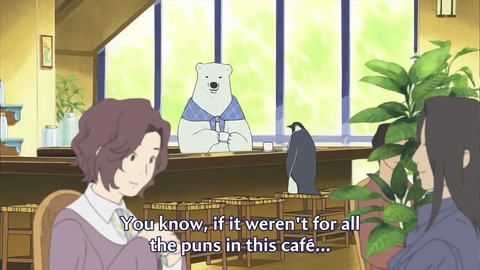
The absolute least the animators could do is have Polar Bear drink a can of Coca-Cola.
Then there’s the characters. The show does surprisingly well it this regard, if only in one way: realism. Though Sasako is there mostly to look pretty and not relate to the animals’ “problems,” all the other characters stay pretty true to form. Penguin can be loud and obnoxious, but fiercely protective. Llama is adorable and oblivious. Polar Bear is subdued and a strong leader. Sloth is nice, yet slow as hell. And Panda…Panda is physically upsetting. He’s so ( so) very lazy, aloof, selfish, single-minded, and conceited that just hearing him speak is angering. For as cuddly and playful as Pandas actually are, they are also depressingly pathetic creatures. Their only source of food is bamboo (which explains the character’s absolute obsession with it), which only grows at one elevation and is woefully lacking in nutrients. This means that Pandas are trapped on the mountains, chewing on bamboo and its leaves in the snow, almost starving to death while constantly consuming its one and only energy source. In this way, the viewer identifies with Panda, solely because the overall show tries so hard to malnourish its audience.
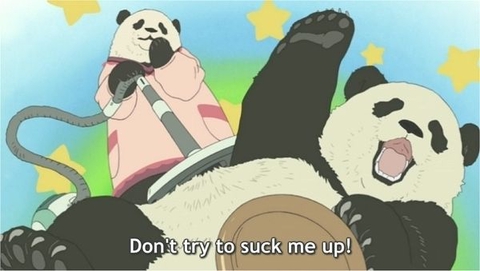
It's the only way to clean all the crap out of your fur.
Mind you, it is mildly entertaining to watch such a variety of animals compare notes on interacting in a decidedly human world. However, everything falls apart when it is revealed that everyone who ISN’T working at the café is working at the local zoo as (shockingly) the animals in the exhibits. Pro tip: if your entire series tries to “humanize” animals, don’t have them work at the zoo.
Aside from trifling backgrounds and a mediocre soundtrack, the audio and visuals are actually pretty good. By that, I mean the characters are highly realistic, almost more than they should be. The animals are practically photocopies of their real-life counterparts, including fairly fine details. The voice actors also contribute greatly to this realism. It’s as though the director made each of them study recordings of the actual animals they would portray and have them match the animals’ pitch and verbal mannerisms. This dramatically helps bring together an authentic-looking vision of animals interacting with one another. The visual humor here derives from the strange and surreal absurdity of the situations. When Penguin asks for a shoulder massage from Polar Bear, his large predatory appendages do exactly what they’re supposed to, and it looks as funny as you’d think. However, the weirdness factor subsides relatively quickly, and the visual humor can’t sustain the show for long. Ironically, comedy is about stories as well, and that’s precisely where the series falls flat.
Perhaps with a better implementation (or at least a better script), Polar Bear Café could have been something more. Unfortunately, the recipe isn’t well thought out and the result is still far too undercooked. Check, please.
Come back next time, as I yearn for the life of adventure.